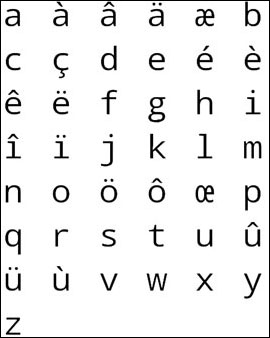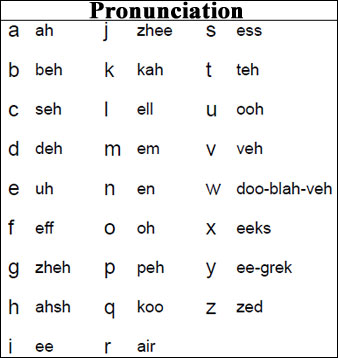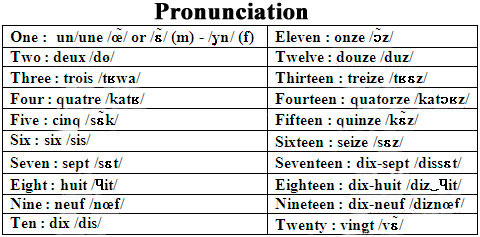French (Français) is the National Language of France. It became France’s Official Language since 1992 as per the Constitution of France. It is a Romance language spoken in France, Belgium, Switzerland, Canada (mostly Quebec), northern New England (mostly in the state of Vermont), the state of Louisiana and in many other countries and regions which were colonies of France. French is known as the ‘World's Second Global Language’ after English, because it the Second-Most Studied Foreign language in the world, after English. French is spoken as a Mother Language by about 72,000,000 people and as a Second Language by some 52,000,000 people. It is one of the five official languages of the United Nations. It is also the Second Most Widely Understood Language in the European Union, after English. According to the European Union, 129 million (or 26% of the Union's total population), in 27 member states speak French, of whom 65 million are native speakers and 69 million claim to speak French either as a second language or as a foreign language, making it the ‘Third-most Spoken Second Language in the European Union’, after English and German. It is mandatory to use French language in official government publications, public education except in specific cases, barring certain cases and legal contracts and advertisements must bear a translation of foreign words. Even though the majority speak the French, all French residents people learn English at school, from 4 to 10 years. As of 2005 there are about 68 million native speakers of French and is ranked in the range of 15-17, amongst most populated French-speaking countries. It is an Official Language of about 29 countries, which are known as La Francophonie, French for community of French-speaking countries. Most of these nations are located in the continent of Africa; an estimated 115 million African people spread across 31 Francophone African countries can speak French as either a First or a Second Language. This however does not mean that other languages are not spoken in these countries. A country may have multiple languages as their official language, for example, the official languages of Belgium are French, Flemish and German. The country is divided in 3 Linguistic Parts: Brussels, Flanders and Wallonia.
List of 29 Countries whose Official Language is French
|
Name of the Country |
Continent |
French Speakers - 2005 Estimation |
|
France |
Europe |
60,578,600 |
|
Côte d'Ivoire |
Africa |
12,740,000 |
|
Canada |
N. America |
6,741,955 |
|
Democratic Republic of the Congo |
Africa |
6,080,000 |
|
Haiti |
C. America |
5,664,000 |
|
Belgium |
Europe |
4,300,000 |
|
Cameroon |
Africa |
2,950,300 |
|
Guinea |
Africa |
2,000,000 |
|
Togo |
Africa |
2,000,000 |
|
Chad |
Africa |
1,940,000 |
|
Switzerland |
Europe |
1,509,600 |
|
Niger |
Africa |
1,260,000 |
|
Republic of the Congo |
Africa |
1,200,000 |
|
Gabon |
Africa |
1,200,000 |
|
Senegal |
Africa |
1,170,000 |
|
Mali |
Africa |
1,107,000 |
|
Central African Republic |
Africa |
945,000 |
|
Madagascar |
Africa |
865,000 |
|
Benin |
Africa |
739,200 |
|
Burkina Faso |
Africa |
695,000 |
|
Rwanda |
Africa |
609,000 |
|
Luxembourg |
Europe |
430,000 |
|
Burundi |
Africa |
390,000 |
|
Comoros |
Africa |
312,200 |
|
Djibouti |
Africa |
159,800 |
|
Equatorial Guinea |
Africa |
100,000 |
|
Vanuatu |
Oceania |
99,000 |
|
Monaco |
Europe |
23,400 |
|
Seychelles |
Africa |
4,000 |
French Language Dialects
The standard for French is based on the dialect of Île de France, technically known as Francien which has been the official standard language since the mid-16th century. Francien has largely replaced other regional dialects of French spoken in northern and central France; these dialects made up the so-called Langue d'oïl (the term is based on the French use of the word oïl, modern oui, for yes).
French Dialects are Classified in 5 Groups-
- Central : Francien, Orléanais, Bourbonnais, Champenois.
- Northern : Picard, Northern Norman, Walloon (usually considered a separate language).
- Eastern : Lorrain, Bourguignon (Burgundian), Franc-Comtois.
- Western : Norman, Gallo (around the Celtic Breton area), Angevin, Maine.
- Southwestern : Poitevin, Saintongeais, Angoumois.
French regional dialects are still in use but mostly in uneducated rural speech. In the medieval times the Picard-Walloon dialect of northern France and the Norman dialect of western France was at par with Francien dialect. However, walloon dialect is still in use in Belgium. Standard French has also greatly reduced the use of the Occitan language of southern France (the so-called Langue d'oc, from Provençal oc for yes). Occitan's major dialect, Provençal, was a widely used medieval literary language. There are a vast number of dialects of the French language spoken all over the world.
|
|
||||
|
African French |
American French |
Asian French |
Canadian French |
European Dialects |
|
|
|
|
|
|
|
Mauritian Creole |
Cajun French |
Cambodian French |
Acadian French |
Aostan French |
|
Maghreb French (North African French) |
Guyana French |
|
Newfoundland French |
Belgian French |
|
|
Missouri French |
Indian French |
Quebec French |
French-based creole languages |
|
|
West Indian French |
Lao French |
|
Jersey Legal French |
|
|
|
Vietnamese French |
|
Louisiana Creole French |
|
|
|
|
|
Métis French |
|
|
|
|
|
Meridional French |
|
|
|
|
|
Metropolitan French |
|
|
|
|
|
New Caledonian French |
|
|
|
|
|
Swiss French |
Origin and History
One of the earliest French literature appeared in written materials dating from the Strasbourg Oaths of 842. It was an oath sworn by Louis the German (Louis II) and Charles the Bald (Charles II) against their brother Lothar in the partitioning of the empire of their grandfather Charlemagne. French is a Romance language descended from Latin. It is called a Romance Language as it comes from the word Roman and simply mean 'From Latin'. It primarily descended from Vulgar Latin that evolved out of the Gallo-Romance dialects spoken in northern France. The term Vulgar Latin has been derived as a result of Roman Conquest over Gaul (modern france). Gaul was conquered by the Romans in the 2nd and 1st centuries BC, its inhabitants at the time spoke Gaulish (a Celtic language) but this was rapidly taken over by the Latin of the Roman invaders. Its closest relatives however are the other Langues d'oïl and French-based creole languages. Its development was also influenced by the Germanic Frankish language of the post-Roman Frankish invaders. By the end of the 13th century 'Old French' had begun to develop into regional dialects. In general the dialects spoken in the Northern parts of France were referred to as Language d'Oïl and those spoken in the Southern parts were referred to as Langue d'Oc. These dialects included ‘Le Francien’ spoken in and around Paris, ‘Breton’ spoken in Brittany, "Le Picard" spoken in Picardie and "Occitan" spoken in Southern France. However the dialect of Paris soon began to dominate especially in administration and politics and Le Francien soon became to be known as the standard for French. In fact, the dialect of Paris actually became the law during the French Revolution.
The history of French language can be divided into development of various ancestral languages of French. These emerged and developed during different period of time.
- Gallo-Romance Languages – Gallo-Romance languages include French and the other langue d'oïl dialects, Occitan (langue d'oc), Franco-Provençal, Gallo-Italic, and other languages (sociolects). These emerged and developed during 5th - 8th Centuries. The Vulgar Latin in Gaul developed specific features that made it distinct from the Latin spoken in the other regions of the Roman Empire. The Reichenau Glosses are a good example of its phonetics and vocabulary.
- Old French - Old French is a direct descendent of Old Gallo-Romance. It was a mixture of Celtic / Gaulish and Germanic words but with a strong Latin basis. Old French emerged when the Roman Empire conquered Gaul during the campaigns of Julius Caesar, which were almost complete by 51 BC. Under his rule, the usage of the Latin language was introduced which influenced and eliminated the local language, Gaul. The dialects of Northern Gaul developed into separate language with a grammar of its own. During the Barbarian invasion of the Roman Gaul (presently Belgium and France) brought some Germanic terminology into the prevalent language. The name français is derived from the Germanic tribe of the Franks who conquered portions of Roman Gaul. Other Germanic words in Old French appeared as a result of Norman, i.e. Viking, settlements in Normandy during the 10th century. The settlers spoke Old Norse and their settlement was legitimised and made permanent in 911 under Rollo of Normandy. The Old French literature flourished from 9th to 13th centuries.
- Middle French - Middle French is a historical division of the French language which covers the period from roughly during 1340 to 1611 (14th-15th centuries). This period was marked by changes both in the pronunciation and in the grammar. A common literary language, based on the dialect of Île de France, a region of Paris, was promoted by the writers. French was replacing Latin in the texts of the public administration in France. The French language was becoming clearly distinguishable from the other competing Oïl languages (collection of different dialects).
Major Middle French Changes:
1. The French language was imposed as the Official Language of the kingdom of France in place of Latin and other Oïl and Occitan languages. This was done to counter the influence of Latin which was still used by elites as the language of education, administration and bureaucracy. In 1539, the Ordinance of Villers-Cotterêts was passed under the rule of François I (king of france) making French as the only language for legal and juridical acts.
2. The French wars in Italy and the presence of Italians in the French court brought the French into contact with Italian humanism (philosophical movement). Many Spanish and Americas words were introduced in French language.
3. This period saw the publication of the first French grammars and of the French-Latin dictionary of Robert Estienne (1539).
- Early Modern French – Early Modern French was a period during the 16th century, which saw further development and the standardization of Middle French. This was done to combat Oïl languages which were still prevalent. Though, French was legalised as official language, there was a large percentage of population which did not speak or understand standard French. The southern population still used Occitan languages like Provençal and other inhabitants spoke Breton, Catalan, Basque, Dutch (West Flemish) and Franco-Provençal. In the north of France, regional dialects of the various langues d'oïl continued to be spoken in rural communities. The French revolution made the French as the teaching language in all the schools. The legalised French was being started to be used in the legal system, which differed from the French used before the revolution. Like the orators during the French revolution, the pronunciation of every syllable become the new language. Further efforts were strengthened by poets of La Pléiade who wanted to elevate the French language at par with Latin as a medium for literary expression.
- Classical Modern French - Classical Modern French or Français Classique developed during the 17th – 18th Centuries. The foundation of the Académie française (French Academy) in 1634 by Cardinal Richelieu created an official body meant for purification and preservation of the French language. It had a group of 40 members, known as the Immortals because of the official seal given to them by their founder Richelieu was engraved with - "À l'immortalité" ["to the Immortality (of the French language)"]. Grammar was fixed in this period with certain specific rules. French was adopted in international treaties in 1714. French Colonization in North America, West Indies, India and Africa spread the language to international boundaries. By then it was used as an international language throughout Europe and even in the administrative correspondence of countries as Germany.
- Contemporary Modern French – Contemporary Modern French was established from 19th Century onwards. The contemporary pronunciation of the standard language was fixed in that period. French was established as an official language in the French and Belgian colonial possessions in Africa. Structurally, French has changed comparatively little since the Classic Modern period but it’s vocabulary and style has been influenced by romanticism and realism movements. Further standardisation was made with the help of education and the media.
French Alphabets
The French alphabet is based on the 26 Letters of the Latin alphabet, uppercase and lowercase, with 5 Diacritics and 2 Orthographic Ligatures.


Cardinal numbers in French from 1 to 20 are as follows:

French Vocabulary
Two third of the French vocabulary is derived from Latin. Other languages which became the part of the French Vocabulary include German including Frankish, Gaulish language, English (Anglo-Saxon) language, modern English, Arabic etc. It is difficult to identify the Latin source of native French words, because in the evolution from Vulgar Latin, unstressed syllables were severely reduced and the remaining vowels and consonants underwent significant modifications. It is estimated that 12% (4,200) of common French words found in a typical dictionary such as the Petit Larousse or Micro-Robert Plus (35,000 words) are of foreign origin (where Greek and Latin learned words are not seen as foreign). About 25% (1,054) of these foreign words come from English and are fairly recent borrowings. The others are some 707 words from Italian, 550 from ancient Germanic languages, 481 from other Gallo-Romance languages, 215 from Arabic, 164 from German, 160 from Celtic languages, 159 from Spanish, 153 from Dutch, 112 from Persian and Sanskrit, 101 from Native American languages, 89 from other Asian languages, 56 from other Afro-Asiatic languages, 55 from Slavic languages and Baltic languages, 10 from Basque and 144 (about 3%) from other languages.
Few Words derived from other Languages:
Arabic – Magasin= Magazine, Orange= Orange.
Gaul – Crême for Cream, Mouton for Ram, Brébis for Sheep, Bouleau for work.
German – Choisir=Choose, Gai=Gay, Garantir=Guarantee, Gagner=Gain, Guerre=War.
Modern English – Drainer = Drain, Locquet = Lock, Wagon = Wagon.
Old English (Anglo-Saxon) – Bateau=Ship, Baupré = Bowsprit.
Some Simple French Words
- Bonjour = Hello.
- Bonsoir = Good evening.
- Bonne Nuit = Good night.
- Au revoir = Goodbye.
- Merci = Thank you.
- Oui = Yes.
- Non = No.
Phonology
Modern French has 15 vowels and 20 consonants. The vowels are opened and close (as [e] : [o]), labialized ([œ], [ø], [y]) and nasalized. Phonetically distinctive French sounds are the Nasal Vowels and the Uvular R.
3 accents over vowels are employed:
- The Acute (´) over e.
- The Grave (`) over a and e.
- The Circumflex (^) over a, e, i, o, and u.
The present day French pronunciation may be characterized as Modus Intensus - the words consists predominantly of open syllables (i.e. ending in vowels), the falling diphthongs (vowel sounds) are suppressed, the lips are used actively in the articulation of the sounds. The modern language is marked especially by the rising diphthongs (vowel sound) ui and oi (pronounced [wa]). The stress is fixed on the ultimate syllable of the word. The words, being relatively short, are pronounced in groups marked by a common accent. The speech flow in modern French is rated at 320 words per minute.
Orthography
Written French uses the Roman alphabet. French spelling has many silent letters which are may sound strange when pronounced. For example, final consonants are generally not sounded. An s or x added to the end of a noun to form the plural is also usually not pronounced. In such a case, the plural number is actually indicated in speech by the form of the article, as in le garçon (lu gärsôN') [key] [the boy] and les garçons (lÄ gärsôN') [key] [the boys]. French spelling, however, is closer to the pronunciation than is English spelling.
Grammar Characteristics:
French has 2 Genders: All Nouns are either Masculine or Feminine.
French verbs are categorized by their endings: -ER, -IR, and -RE. Each of these categories can be further broken down into regular, irregular, impersonal, and reflexive verbs.
There are 11 main verb forms:
Simple Verb Forms
1. Present - je vais.
2. Imperfect - j'allais.
3. Future - j'irai.
4. Conditional - j'irais.
5. Subjunctive - que j'aille.
6. Imperative - va !
Compound Verb Forms
7. Passé composé - je suis allé.
8. Pluperfect - j'étais allé.
9. Future perfect - je serai allé.
10. Conditional perfect - je serais allé.
11. Past subjunctive - que je sois allé.
